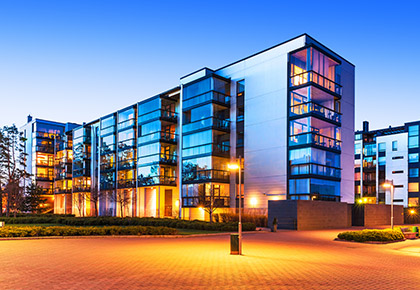-
Tips for Eco-Friendly High-Rise Living: Living Sustainably in the City
Many multifamily properties and high-rises want to implement “green” living practices and create eco-friendly communities, but not everyone knows where nor how to get started. Here are some effective and easy tips to help you be proactive and successful in achieving your sustainability goals. Read on for a list of programs and services that can be put in place in your community at little to no cost. -
Tips to Help Your Homeowners Association Organize a Community Recycling Program
Is your homeowners association considering starting a recycling program for your community? If so, bravo! Take a look at some of the benefits: conserving energy, saving water, preserving resources, reducing air pollution and saving landfill space. And did you know that in addition to helping the environment, recycling can also provide economic benefits as well? To get you started, here are some tips and considerations to help your association plan and implement a successful recycling program for your community. -
Ways to Keep Your Community Safe During Tornado Season
Tornadoes are fearsome because of their unpredictable nature. Although there are certain weather conditions that make tornadoes more likely, such as severe summer thunderstorms, tornadoes can also be created by snowstorms and blizzards. They can strike at any time of year and almost any place, even forming on the water and moving onto land. -
How to Uncover Savings for Your Condo or Co-op Association with an Energy Audit - Energy Efficiency Part 2
Improving your building’s energy efficiency is good for your budget and for your property values. Getting a professional energy audit is a crucial step on the road toward energy efficiency. It can tell you which upgrades make the most sense for your property and show you potential energy and cost savings. -
Updating Your Community Emergency Preparedness Plan for Pandemics
In the past, when planning for emergencies, a global pandemic was likely not on your list. While most board members did not anticipate a pandemic as something that needed a plan before COVID-19, it's now clear that communities need to develop a plan to address this and any future pandemics. Read on to learn how to build a community emergency preparedness plan with a possible resurgence of coronavirus and other potential pandemics in mind. -

5 ways to reduce energy costs in your condo or coop
No matter where your high-rise building is located, rising energy costs can have a drastic impact on your community association’s budget. Implementing methods to conserve energy can help your association reduce energy costs and optimize your high-rise’s annual budget. -
What’s missing from your community association budget?
Every year about the same time, your community association board is most likely creating its budget for the following year. Learn about seven commonly neglected items in community association budgets that you may be missing. -
What to Know in the Unlikely Event of a Mass Shooting in Your Building
Public Mass shootings have unfortunately become common place in America and around the world. From schools and movie theaters, to businesses and homes, shootings have occurred in a mix of environments. But what should you do if you unexpectedly find yourself in the middle of this kind of emergency at your residential building? -
What Do I Need To Know About Floods?
2016 saw the United States swamped in a record year of flooding, the most since record keeping began in 1980. Devastating flooding swept Louisiana, West Virginia, Texas and Maryland, costing billions in damage. In Canada, about half of all natural disaster costs are incurred from flooding, reaching into the billions of dollars in recent years. -
Why community associations get sued and what to do if it happens to you
Your community or condominium association is there to protect the interests of all of its members. However, there may be situations when one or more residents don’t believe that the association is on their side. Hopefully, everyone involved can come to a reasonable solution, but if you can’t, it’s possible that your association – and even your board members – could become the target of a lawsuit. -
Why Your Community Must Plan for Emergency Communication and Training
Whether you live in a high-rise condominium in Chicago, a homeowners association (HOA) in Houston or an active adult community in Las Vegas, emergencies can happen. Do you think your residents would know where to go or whom to contact in an emergency situation? Does your onsite staff know what to do to protect residents and the community’s property in the event of a major storm like a hurricane, tornado or severe blizzard? How well would they handle a flood, a fire or a violent outbreak? -
Email Communication
You may be unaware that you are opening up all of your emails to scrutiny. When using a personal or work email address to conduct association business, there is a potential liability involved. -
How Can My Association Fund Capital Improvements?
Nothing lasts forever…and when it comes time to replace your high-rise roof, community pool or to add new amenities, your association will need to determine how to pay for it. All of these things – significant repairs and replacements, as well as new construction – are considered capital improvements. -
12 to-do’s for ultimate HOA landscaping maintenance
A good spring-cleaning can do wonders for your community association. Here are some tips to get your started. -
What is The Best Pool Heater for Your Community?
Even in the sunny warmth of Florida, water in a swimming pool isn't usually warm enough. Solution? A pool heater. There are several options, each with pros and cons, according to Chris Normandeau, director of FS Energy. -
What to Know About an HOA Emergency Board Meeting During Trying Times
It's hurricane season again. As soon as June 1st rolls around, we are assaulted with hurricane preparedness pamphlets and emergency information at every turn. -
Communication in an Emergency is Key to Hurricane Preparation and Rebuilding
The strongest hurricane preparedness plan won’t be effective if you haven’t communicated it. Make sure that everyone knows what to do by following these important recommendations. -
Energy Efficiency for Community Associations
Many community association boards and residents would like to implement energy efficiency measures in their communities. But what about the cost to get started? -
First Locally Transmitted Virus Case Confirmed for Zika in Florida
In February, the World Health Organization declared a public health emergency when cases of the Zika virus began to spread, impacting Florida. -
Six New Things You Should Know About Flood Insurance in Florida
As a Floridian, you're pretty familiar with flood insurance, but you may not be aware of the recent changes in the law. Learn more here! -
Five Ways to Get Ready for a Pool Inspection
A pool inspection can be a major source of anxiety for board members and residents. Don't throw in the towel; there are steps you can take to make sure your inspection goes...well, swimmingly. -

Tips for Reducing Energy Consumption and Costs in Your Community
Get helpful tips that your HOA or condo association can do to reduce energy consumption and lower your community’s electric bills. Learn more! -
Four Ways to Get Mosquitoes to Buzz Off
Ah, summertime in Florida. Backyard barbecues. Long days at the beach. And endless mosquito bites. -
Hurricane Season is Here: Have You Talked to Your Vendors?
Your vendors are a critical part of your community’s emergency planning for any kind of hurricane or storm. Are you on the same page before, during and after a storm?